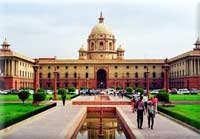Ahead of 1979, we were not rejoicing "Law Day". It first transpired to the Supreme Court Bar Association in 1979, under the vibrant leadership of Dr L.M. Singhvi, to select 26th November to commemorate the similar as "Law Day". November 26, 1949 was the day on which the people of India gave to themselves the exclusive manuscript to govern their national life i.e. the Constitution of India. This document was delightfully designed to make this country a Democratic Republic to be governed by Rule of Law and to continue it as one huge nation with its astonishing and matchless unity in diversity.
Why should we venerate this day and celebrate it as Law Day?
Dr Singhvi spelt out the main purposes of celebrating "Law Day" in the following terms:
1. To assess the state of law and administration of justice.
2. To suggest ways and means to recover our legal and judicial system.
3. To reinforce the Bar and the Bench relationship.
4. To toughen the independence of the judiciary.
5. To brace the freedom of the legal profession.
6. To make the legal and judicial system a valuable instrument to serve the people.
7. To sustain and enlarge public confidence in our legal and judicial scheme.
The aforementioned sevenfold objects of celebrating "Law Day" converge on one single objective in final analysis viz.: to be a cohesive democracy governed by the Rule of Law. In fact, true democracy and the Rule of Law always go together. It is the rule of law which sentry's a democratic polity. This phase of the rationale of celebrating Law Day was designated by Hon'ble Mr. Justice P.N. Bhagwati whilst delivering his "Law Day" address on 26th November, 1985 by saying: "It is therefore in the fitness of things that on the day on which the Constitution was implemented and endorsed should wish to emphasize and highlight the fundamental role of law in society and remind ourselves of the sublime purpose which law is intended to serve in a Republic governed by Rule of Law."
It is thus clear from the words of these two memorable sons of India that the real purpose of celebrating Law Day is to re-dedicate ourselves to the subsequent cardinal principles which form the solid foundation on which this grand constitutional edifice is erected:
 I. Rule of law.
I. Rule of law.II. Independence of the judiciary.
III. Independence of the legal profession.
These three principles are intimately interconnected. The focal purpose of an independent judiciary and an independent Bar is only to ensure that there is a Rule of Law. The main endeavor of celebrating Law Day is to make sure and to offer ourselves to the Rule of Law. For all these reasons, when we say "Law Day", we really mean: Rule of Law Day!
The rationale of celebrating Law Day is to create awareness and to identify and to remove the hurdles in the effective working of the legal and judicial system. Above all, it is our duty to progress the public image of the legal profession and of the judiciary. There is no difficulty about the image of the judiciary as of now. People are immensely satisfied about its effective and purposeful functioning. We have to only maintain this image.
But, there is some problem about the image of the legal profession. People have no good impression about lawyers. Though vast majority of them are really wise, honest, frank and reasonable, a small minority of them have ruined the image of the entire legal profession. Lawyers have a very poor image. No one is prepared to acknowledge a lawyer as his resident. Banks do not trust lawyers even for small loans. In the marriage market too, lawyer is the last item. This wrong impression about lawyers that they are inherently unreasonable persons has to be changed. This cannot be done overnight. It cannot be done by general body resolutions. It has to be done at the entity level by entity transformation. But a simple method is given in a formula prescribed by the ancient texts by saying:
"Paropakararaya punyaya
papam parapeedanam"
Meaning:
"It is helping others which is punya;
It is harming others which is sin."
A still shorter and catchy form of this formula has been given by a divine personage of our own time in the following slogan:
"Help ever, Hurt never;"
If this simple formula is followed by us, the lawyers, in our daily life, we can certainly improve our image. In this too, the role of the elders is very important. Krishna says in the Gita:
"Yadyad aacharathi shrestah
Thatheva ithara janaah
Sa yatpramaanam kurute
Lokasthatu anuvartate"
Meaning: "Whatever the elders do, others try to do
The same; whatever standard the elders set
Up, others try to set up the same standard."
The seniors in the profession by their conduct and behavior have to set an example to the younger ones. They have to behave like ideal human beings. Let us take a pledge today, it being Law Day that we shall adopt in our daily life the five basic values viz. Sathya (Truth), Dharma (Righteousness), Prema (Love), Shanti (Peace) and Ahimsa (Non-violence) which are the universal values extolled by all the religions of the world and which are eternal values. By doing this alone we can improve our image and improve the image of the legal profession itself. This will automatically improve the very image of the legal and judicial system.


